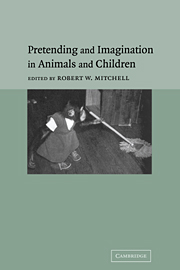Book contents
- Frontmatter
- Contents
- List of contributors
- Foreword by Sue Taylor Parker
- Preface and acknowledgments
- I Historical, developmental, and comparative overviews
- 1 Imaginative animals, pretending children
- 2 A history of pretense in animals and children
- 3 Pretending as representation: a developmental and comparative view
- II Pretense and imagination in children
- III Pretense and imagination in primates
- IV Prospects
- References
- Author Index
- Subject Index
3 - Pretending as representation: a developmental and comparative view
Published online by Cambridge University Press: 13 August 2009
- Frontmatter
- Contents
- List of contributors
- Foreword by Sue Taylor Parker
- Preface and acknowledgments
- I Historical, developmental, and comparative overviews
- 1 Imaginative animals, pretending children
- 2 A history of pretense in animals and children
- 3 Pretending as representation: a developmental and comparative view
- II Pretense and imagination in children
- III Pretense and imagination in primates
- IV Prospects
- References
- Author Index
- Subject Index
Summary
Humans enjoy perceptual experiences of the world from birth, while construing of an imaginal world only becomes possible with development. Considering adult experience, Sartre (1948/1966) distinguishes two aspects of experiencing a portrait of an absent friend. If the focus is on pictorial properties – color, brush stroke, shape – the experience is primarily perceptual. If the portrait serves to evoke thoughts of the friend who is its subject, then the portrait becomes a vehicle for imaginal reflection. There is little controversy regarding the existence of these differing human experiences. However, current discussions of the topic emphasize representation as storage, rather than as a form of psychological experience. To quote a definition, “Representation is defined most simply as stored information” (Mandler, 1998). Given this climate, perhaps it is not surprising that the basic distinction between “perception” and “representation” (more accurately termed “mental representation”) is often not acknowledged in contemporary analyses (e.g., Leslie, 1987; Mandler, 1992, 1998) where infants' processing of perceived events and experience is described as “representation.” Consequently it becomes problematic to discuss distinctions between earlier infant behaviors that seem based on perceptual, sensory and motor experiences, and later behaviors that suggest a basis in mental representation, for example, recall of previous experiences which now come to mind and affect present activities. Developmental changes in representational play can mark the transition from activities based on perceptual and sensorimotor experiences to those indicating imaginal contents (McCune, 1993).
- Type
- Chapter
- Information
- Pretending and Imagination in Animals and Children , pp. 43 - 56Publisher: Cambridge University PressPrint publication year: 2002
- 2
- Cited by



